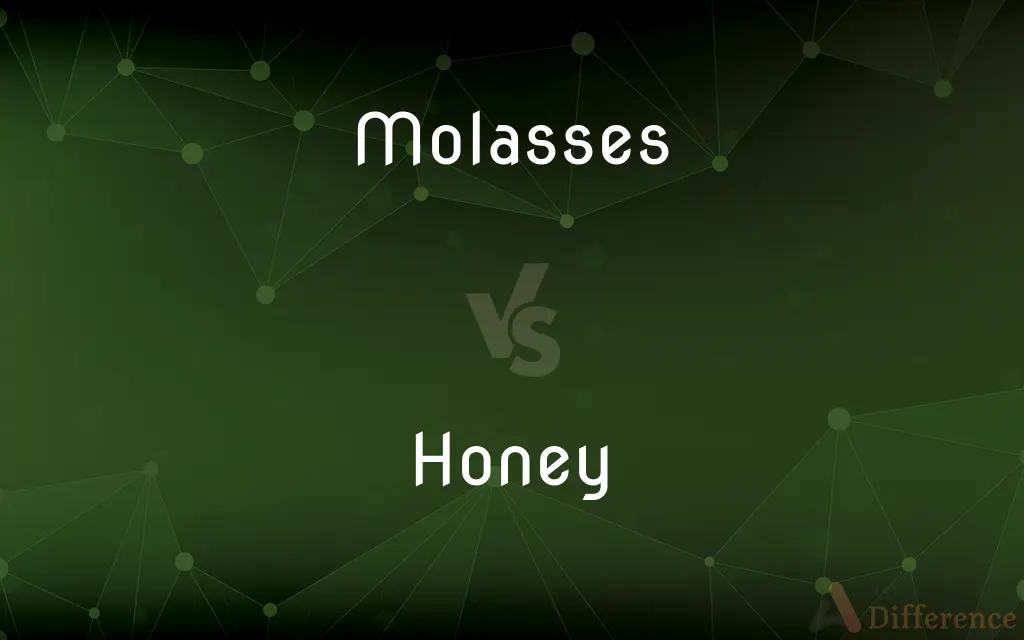Molasses vs. Honey — What's the Difference?
By Tayyaba Rehman & Maham Liaqat — Updated on April 2, 2024
Molasses is a thick, dark syrup byproduct of sugar refining, rich in minerals, while honey is a natural sweetener produced by bees, known for its antibacterial properties.

Difference Between Molasses and Honey
Table of Contents
ADVERTISEMENT
Key Differences
Molasses, derived from the process of refining sugarcane or sugar beets into sugar, varies in flavor and color depending on its processing stage, offering a rich, slightly bitter taste. Honey, on the other hand, is produced by bees from the nectar of flowers, featuring a wide range of flavors and colors based on the flowers visited, generally characterized by its sweet, floral taste.
In terms of nutritional content, molasses is notable for its high mineral content, including iron, calcium, and magnesium, making it a healthier sweetener option compared to refined sugar. Honey, while also containing trace amounts of vitamins and minerals, is primarily valued for its antioxidants and antibacterial properties, contributing to its reputation as a medicinal food.
Molasses is often used in baking and cooking for its robust flavor, contributing to the taste and color of foods like gingerbread and barbecue sauce. Honey's versatility shines through in both sweet and savory dishes, as well as in beverages, where it's appreciated not just for sweetness but also for its flavor-enhancing qualities.
The production of molasses is a byproduct of the sugar industry, meaning its availability and characteristics are closely tied to sugar production methods and volumes. Honey's production, directly dependent on bees, reflects environmental conditions and the health of bee populations, making it an indicator of ecological well-being.
While both molasses and honey serve as sweeteners, their distinct origins, production processes, and nutritional profiles highlight their unique contributions to cuisine and health, making them valuable in different culinary and medicinal contexts.
ADVERTISEMENT
Comparison Chart
Origin
Byproduct of sugar refining from sugarcane or sugar beets.
Natural product made by bees from flower nectar.
Taste
Rich, slightly bitter, depending on the processing stage.
Sweet, with flavors varying by the flowers visited by bees.
Nutritional Value
High in minerals such as iron, calcium, magnesium.
Contains antioxidants, trace minerals, and has antibacterial properties.
Culinary Uses
Used in baking, cooking for flavor and color; common in gingerbread.
Versatile in sweet and savory dishes, beverages; flavor enhancer.
Production Process
Produced as a byproduct of the sugar industry.
Produced by bees, dependent on their foraging from flowers.
Compare with Definitions
Molasses
Common in baking and savory recipes.
The recipe calls for molasses to enrich the color and taste of the barbecue sauce.
Honey
Production reflects ecological well-being.
The diversity of honey flavors in the market showcases the health of local bee populations.
Molasses
Rich in minerals and slightly bitter.
Molasses adds a depth of flavor to the marinade, unmatched by regular sugar.
Honey
Natural sweetener made by bees.
He drizzled honey over his pancakes for a touch of natural sweetness.
Molasses
Varies in color and taste by stage.
Dark molasses was chosen for its robust flavor in the gingerbread recipe.
Honey
Flavor varies with the source of nectar.
The honey, sourced from wildflowers, had a unique and complex flavor.
Molasses
Thick syrup byproduct of sugar production.
She used molasses to sweeten the oatmeal, adding a rich flavor.
Honey
Used in both culinary and medicinal contexts.
Honey soothes sore throats and adds sweetness to tea.
Molasses
Produced from sugarcane or sugar beets.
The molasses in the pantry was derived from sugarcane, offering a glimpse into its tropical origins.
Honey
Contains antioxidants and antibacterial properties.
Honey is used in home remedies for its health benefits.
Molasses
Molasses () or black treacle (British English) is a viscous substance resulting from refining sugarcane or sugar beets into sugar. Molasses varies by the amount of sugar, method of extraction, and age of plant.
Honey
Honey is a sweet, viscous food substance made by honey bees and some related insects, such as stingless bees. Bees produce honey from the sugary secretions of plants (floral nectar) or from secretions of other insects (such as honeydew), by regurgitation, enzymatic activity, and water evaporation.
Molasses
A thick syrup produced in refining raw sugar and ranging from light to dark brown in color.
Honey
A sweet, sticky yellowish-brown fluid made by bees and other insects from nectar collected from flowers.
Molasses
Any of various thick syrups made from juice extracted from the fruits or stalks of certain plants
Pomegranate molasses.
Honey
An excellent example of something
It's one honey of an adaptation
Molasses
A thick, sweet syrup drained from sugarcane, especially (North America) the still thicker and sweeter syrup produced by boiling down raw molasses.
Honey
A sweet yellowish or brownish viscid fluid produced by various bees from the nectar of flowers and used as food.
Molasses
(US) Any similarly thick and sweet syrup produced by boiling down fruit juices, tree saps, etc., especially concentrated maple syrup.
Honey
A similar substance made by certain other insects.
Molasses
(figurative) Anything considered figuratively sweet, especially sweet words.
He really poured on the molasses, charming his audience and changing more than a few votes.
Honey
A sweet substance, such as nectar or syrup.
Molasses
Plural of molass: whiskey made from molasses.
Honey
Sweetness; pleasantness
"The first few years could not have been all honey" (Nadine Gordimer).
Molasses
Synonym of molass: whiskey made from molasses.
Honey
(Informal) Sweetheart; dear. Used as a term of endearment.
Molasses
(geology) molasse
Honey
(Informal) Something remarkably fine
A honey of a car.
Molasses
(obsolete) molass: becomes drunk from molass.
Honey
To sweeten with honey; add honey to.
Molasses
The thick, brown or dark colored, viscid, uncrystallizable sirup which drains from sugar, in the process of manufacture; any thick, viscid, sweet sirup made from vegetable juice or sap, as of the sorghum or maple. See Treacle.
Honey
To make pleasant or appealing
His words were honeyed as he spoke.
Molasses
Thick dark syrup produced by boiling down juice from sugar cane; especially during sugar refining
Honey
To give a yellow or golden color to.
Honey
(uncountable) A viscous, sweet fluid produced from plant nectar by bees. Often used to sweeten tea or to spread on baked goods.
The honey in the pot should last for years.
Honey
(countable) A variety of this substance.
Honey
(rare) Nectar.
Honey
(figuratively) Something sweet or desirable.
Honey
A term of affection.
Honey, would you take out the trash?
Honey, I'm home.
Honey
A woman, especially an attractive one.
Man, there are some fine honeys here tonight!
Honey
A spectrum of pale yellow to brownish-yellow colour, like that of most types of (the sweet substance) honey.
Honey
Involving or resembling honey.
Honey
Of a pale yellow to brownish-yellow colour, like most types of honey.
Honey
(transitive) To sweeten; to make agreeable.
Honey
(transitive) To add honey to.
Honey
(intransitive) To be gentle, agreeable, or coaxing; to talk fondly; to use endearments.
Honey
(intransitive) To be or become obsequiously courteous or complimentary; to fawn.
Honey
A sweet viscid fluid, esp. that collected by bees from flowers of plants, and deposited in the cells of the honeycomb.
Honey
That which is sweet or pleasant, like honey.
The honey of his language.
Honey
Sweet one; - a term of endearment.
Honey, you shall be well desired in Cyprus.
Honey
To be gentle, agreeable, or coaxing; to talk fondly; to use endearments; also, to be or become obsequiously courteous or complimentary; to fawn.
Rough to common men,But honey at the whisper of a lord.
Honey
To make agreeable; to cover or sweeten with, or as with, honey.
Canst thou not honey me with fluent speech?
Honey
A sweet yellow liquid produced by bees
Honey
A beloved person; used as terms of endearment
Honey
Sweeten with honey
Honey
Having the color of honey
Common Curiosities
Can molasses be used as a sugar substitute?
Yes, molasses can substitute sugar in recipes, offering a distinct flavor and additional nutritional benefits.
Is molasses healthier than refined sugar?
Molasses is considered healthier than refined sugar due to its higher mineral content and lower glycemic index.
What are the health benefits of honey?
Honey is known for its antioxidants, antibacterial properties, and potential to soothe coughs and sore throats.
How is honey produced?
Honey is produced by bees from the nectar of flowers, undergoing transformation within the bee before being stored in honeycombs.
How do the flavors of molasses and honey differ?
Molasses has a rich, sometimes bitter flavor, while honey's sweetness is accompanied by floral notes that vary depending on the nectar source.
Why is honey sometimes preferred over sugar or molasses in recipes?
Honey is often preferred for its natural sweetness, unique flavor profiles, and health benefits, including its antioxidants and antibacterial properties.
What are some culinary uses for blackstrap molasses?
Blackstrap molasses is used in robust recipes like baked beans, barbecue sauces, and ginger cookies, offering a deep flavor and a significant source of iron and other minerals.
What is molasses?
Molasses is a dark, thick syrup byproduct of refining sugarcane or sugar beets into sugar, known for its rich mineral content.
Can honey and molasses be used interchangeably in recipes?
While they can sometimes substitute for each other, differences in flavor and moisture content may affect the recipe outcome.
What are the different types of molasses?
There are several types of molasses, such as light, dark, and blackstrap, each varying in sweetness, color, and nutritional content depending on the processing stage.
Can the consumption of honey have negative effects?
Honey is generally safe for most people, but it should not be given to infants under one year old due to the risk of botulism, and those with allergies to bee pollen should also exercise caution.
How can the flavor of honey vary?
The flavor of honey can vary dramatically based on the type of flowers from which bees collect nectar, ranging from mild and sweet to strong and pungent, influencing its culinary uses.
How does the production of molasses impact the environment?
The environmental impact of molasses production is largely tied to the sugar industry, including concerns over land use, water consumption, and chemical inputs.
Share Your Discovery

Previous Comparison
Cooperative vs. Partnership
Next Comparison
Zodiac vs. HoroscopeAuthor Spotlight
Written by
Tayyaba RehmanTayyaba Rehman is a distinguished writer, currently serving as a primary contributor to askdifference.com. As a researcher in semantics and etymology, Tayyaba's passion for the complexity of languages and their distinctions has found a perfect home on the platform. Tayyaba delves into the intricacies of language, distinguishing between commonly confused words and phrases, thereby providing clarity for readers worldwide.
Co-written by
Maham Liaqat















































